
After a backlash from Democrats and human rights activists, the White House abruptly reversed course on Friday on the number of refugees it will allow into the United States, a reflection of President Biden’s continuing struggle with immigration policy.
At midday on Friday, the administration had said it would limit the number of refugees allowed into the United States this year to the historically low level of 15,000 set by the Trump administration, breaking an earlier pledge to greatly increase that number and let in more than 60,000 people fleeing war and persecution.
But that announcement drew immediate criticism from Democratic leaders. In a statement, Senator Dick Durbin, Democrat of Illinois and the majority whip, called the administration’s admissions target “unacceptable.”
“Facing the greatest refugee crisis in our time, there is no reason to limit the number to 15,000,” Mr. Durbin said. “Say it ain’t so, President Joe.”
Just hours later, the White House put out a statement saying it expected to increase the cap next month. It did not comment when asked to specify the number.
The sudden shifts come as the United States struggles with a surge of unaccompanied children and teenagers at the Mexican border, and growing concerns that the increase has already overwhelmed the refugee branch of the Department of Health and Human Services, according to two senior administration officials who spoke on the condition of anonymity to discuss the decision-making.
Mr. Biden had promised in February to raise the cap of 15,000 refugees set by the Trump administration — the lowest in the program’s history. Secretary of State Antony J. Blinken notified Congress on Feb. 12 that the administration planned to allow up to 62,500 refugees to enter the country in the fiscal year ending Sept. 30, citing “grave humanitarian concerns” around the world.
But for two months, Mr. Biden did not sign a presidential determination that would have allowed refugees to board flights to the United States.
Maintaining the Trump-era admissions level would leave thousands of refugees who have been approved to travel to the United States stranded in camps around the world. Roughly 35,000 refugees have already been vetted by the U.S. government and are prepared to travel to the United States.
While those who step on American soil are legally entitled to apply for asylum and can eventually appear before an immigration judge, refugees apply for protection overseas and are forced to clear multiple levels of vetting that can often take years.
The Office of Refugee Resettlement is responsible for sheltering migrant minors who cross the border but has a separate budget line for assisting refugees who come from overseas. The State Department also assists refugees for the first three months after their arrival.
Mr. Biden had previously made changes to the program. The Trump-era program gave priority to Iraqis who had worked for the U.S. military and people, primarily Christians, who were facing religious persecution. But the classification disqualified most other Muslim and African refugees. As a region, Africa has the most displaced people needing resettlement.
transcript
transcript
U.S. and Japan Pledge to Advance Democratic Values
President Biden welcomed Prime Minister Yoshihide Suga of Japan to the White House, where they pledged to work together to counter authoritarianism and advance “shared democratic norms.”
-
Japan and the United States are two strong democracies in the region, and we’re committed, we’re committed to defending and advancing our shared values, including human rights and the rule of law. Secondly, Japan and the United States are both deeply invested in innovation and looking to the future. That includes making sure we invest in and protect the technologies that will maintain and sharpen our competitive edge. And those technologies are governed by shared democratic norms that we both share, norms set by democracies, not by autocracies.
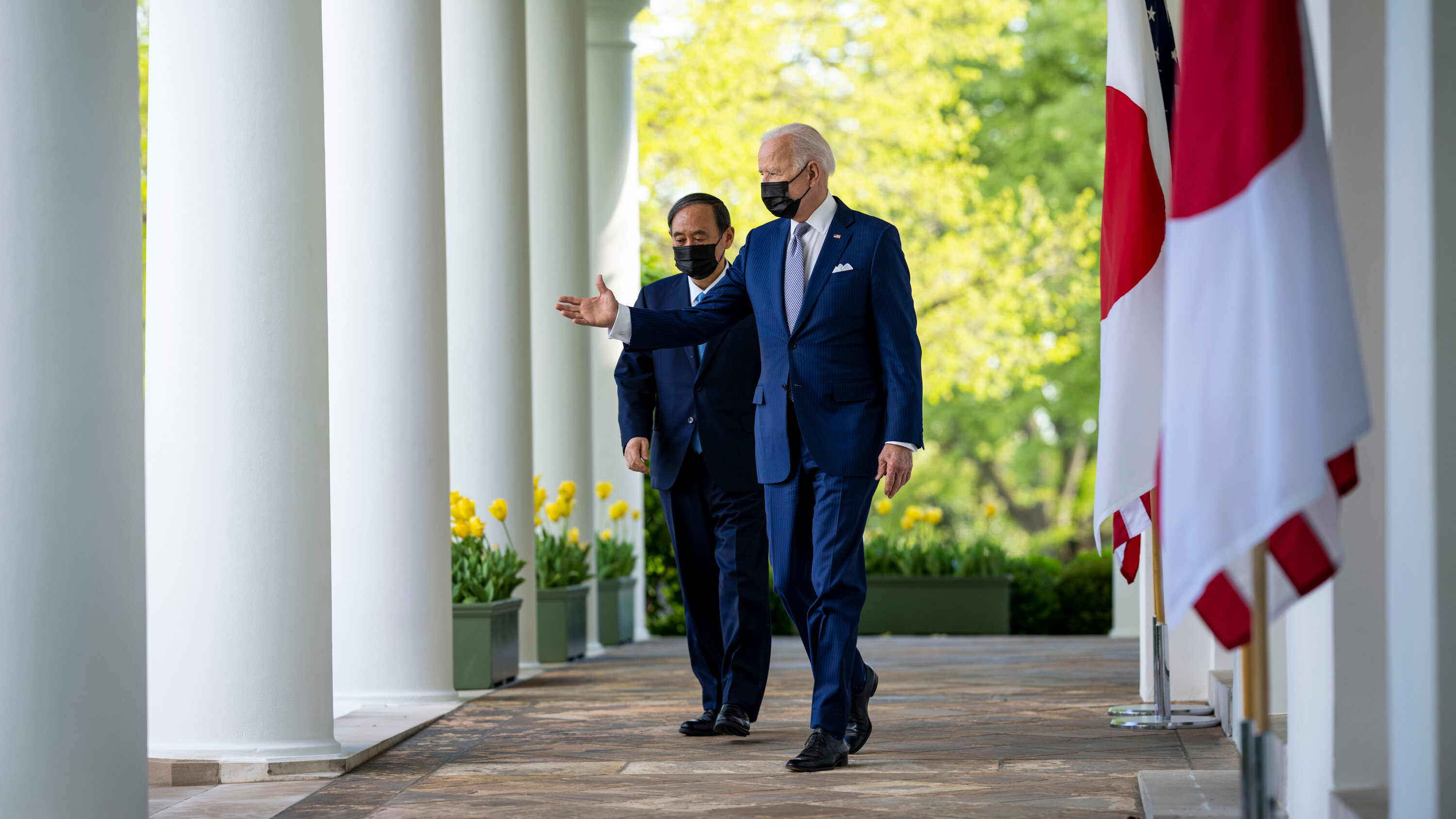
President Biden welcomed Prime Minister Yoshihide Suga of Japan to the White House on Friday, using the first visit by a foreign leader during his presidency to underscore the importance of America’s allies as the United States confronts an increasingly aggressive China.
“Our commitment to meet in person is indicative of the importance, the value we both place on this relationship,” Mr. Biden said during a joint appearance in the Rose Garden with Mr. Suga, pointing out that they had previously held a socially distanced diplomatic visit. “We’re going to work together to prove that democracies can still compete and win in the 21st century.”
The Japanese were honored by the invitation to the White House and eager for the chance to use it at home to underscore how they are nurturing the alliance 75 years after the end of World War II. For Mr. Biden, the visit was an opportunity to press his counterpart for support in the effort to contain China’s ambitions, both economically and militarily.
Mr. Biden has made it clear that he views Chinese influence around the globe as one of the key challenges of his presidency, and he did not mince words when outlining that shared initiatives on climate, health policy and technology would be in competition with China’s autocratic government.
“Japan and the United States are both deeply invested in innovation and looking to the future,” Mr. Biden said during his appearance with Mr. Suga. “That includes making sure we invest in and protect the technologies that will maintain and sharpen our competitive edge, and that those technologies are governed by shared democratic norms that we both share — norms set by democracies, not autocracies.”
Mr. Biden’s advisers have warned that if the United States does not engage allies in a race to catch up, the results could be disastrous for national security: More and more of the globe’s internet traffic and conversations will flow through circuits controlled by Beijing.
“We’re committed to defending and advancing our shared values, including human rights and the rule of law,” Mr. Biden said. “We’re going to work together to prove that democracies can still compete and win in the 21st century.”
He then turned the floor over to Mr. Suga, who said the alliance between the United States and Japan had grown more important because of “the current regional situation and the severe security environment.”
As the two leaders fielded a series of questions from reporters, Mr. Biden was asked about gun control in the wake of another mass shooting that left eight dead at a FedEx facility in Indianapolis. Earlier in the day, Mr. Suga — whose country reports some of the lowest rates of gun crime in the world — expressed his condolences. “Innocent citizens must not be exposed to any such violence,” he said in remarks before a bilateral meeting.
For his part, Mr. Suga was asked about hosting the Olympic Games, scheduled for Tokyo in July, in the midst of a pandemic.
“I told the president about my determination to realize the Tokyo Olympic and Paralympic Games this summer as a symbol of the global unity,” Mr. Suga said. “President Biden once again expressed his support for this determination.”
Climate change was also on the agenda, though Mr. Suga did not promise that Japan would end government funding for the development of coal plants overseas, an announcement the White House was hoping he would make. According to two administration officials, the administration has prodded the Japanese government to cut emissions in half from 2013 levels by the end of the decade.
Next week, Mr. Biden is hosting a virtual summit meeting of 40 world leaders aimed at bolstering global ambition to reduce planet-warming pollution. The Biden administration has also been pressing the Japanese government to stand with the United States in announcing new greenhouse gas emissions pledges.

A member of the Oath Keepers militia who was charged in connection with the riot at the Capitol pleaded guilty on Friday and agreed to cooperate with the government — potentially against other members of the far-right group.
The guilty plea by the Oath Keeper, Jon Ryan Schaffer, 53, of Indiana, was the first to be entered publicly by any of the more than 400 people who have been charged so far in the Jan. 6 riot. News of the plea emerged last week after secret documents in Mr. Schaffer’s case were briefly unsealed by accident on a federal court database.
Mr. Schaffer’s cooperation with the government could prove instrumental in helping prosecutors pursue much broader conspiracy charges against 12 other members of the Oath Keepers who stand accused of the some of the most serious crimes in the sprawling investigation.
The Oath Keeper conspiracy case is one of two large cases in which prosecutors have charged rioters with hatching plans to commit violence at the Capitol as early as November. As part of the case, the authorities have said they are investigating Stewart Rhodes, the founder of the Oath Keepers, who was at the Capitol on Jan. 6 but did not appear to have entered the building.
The other large conspiracy case involves four leaders of the far-right nationalist group the Proud Boys who led a mob of about 100 members and supporters past police barricades at the Capitol.
Mr. Schaffer, who is also a guitarist and songwriter for the heavy-metal band Iced Earth, was initially charged on Jan. 16, in what amounted to a first wave of criminal complaints, and accused of carrying bear spray and engaging in “verbal altercations” with police officers at the Capitol. Photos from the riot show him wearing a blue hooded sweatshirt under a tactical vest and a baseball cap that read “Oath Keepers Lifetime Member.”
At a hearing in Federal District Court in Washington, Mr. Schaffer pleaded guilty to two charges: obstruction of an official proceeding and entering a restricted building with a dangerous weapon. Both are felonies and carry a combined total of up to 30 years in prison.
As part of Mr. Schaffer’s deal with the government, prosecutors have agreed to sponsor him for the witness protection program.
transcript
transcript
“It’s a National Embarrassment,’ Biden Says on Gun Violence
President Biden said on Friday that he was committed to passing gun control legislation and called on Senate Republicans to support a bill already passed by the House.
-
I strongly support — I strongly support — the universal background checks, which I continue to push. The Congress has to step up and act. The Senate has to act. And I strongly support — and continue, and never stopped supporting — the ban on assault weapons and magazines that hold more than 10 — 10 bullets. And I strongly, strongly urge my Republican friends in the Congress who even refuse to bring up the House-passed bill to bring it up now. This has to end. It’s a national embarrassment. It is a national embarrassment. What’s going on? And it’s not only these mass shootings that are occurring every single day. Every single day, there’s a mass shooting this — in the United States, if you count all those who were killed out on the streets of our cities and our rural areas. It’s a national embarrassment and must come to an end. And one last thing: The folks who own weapons — the folks who own guns — they support universal background checks. A majority of them think we should not be selling assault weapons. Who in God’s name needs a weapon that can hold 100 rounds or 40 rounds or 20 rounds? It’s just wrong. And I’m not going to give up till it’s done.
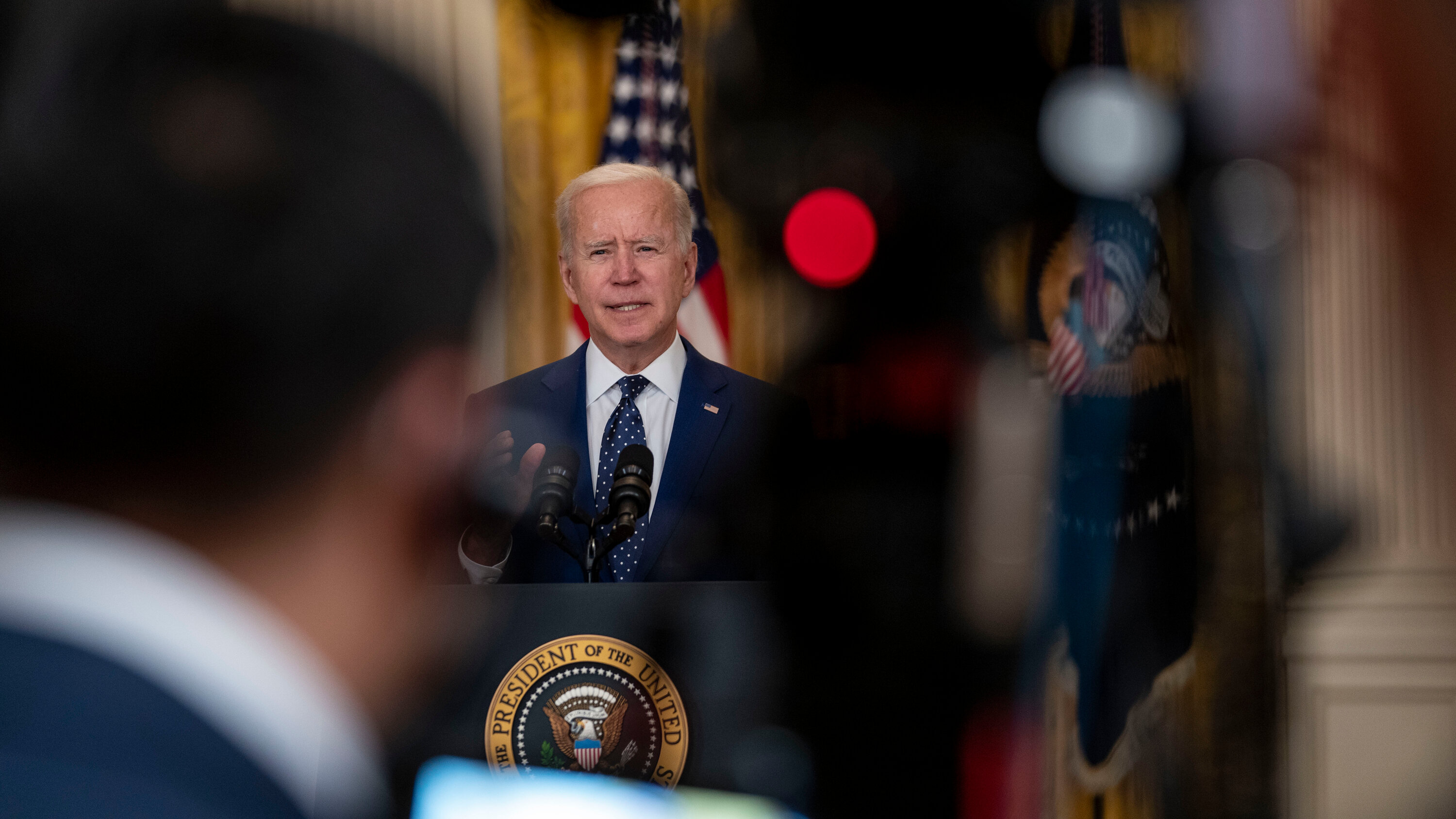
President Biden pledged to “do more” to address gun violence and implored Congress to act after a mass shooting in Indianapolis left eight people dead. But his administration, scrambling to respond to a new cycle of violence, rejected calls to appoint a gun “czar” to more forcefully confront the crisis.
At a news conference on Friday with the Japanese prime minister, Mr. Biden called gun violence across the country “a national embarrassment” and urged Senate Republicans to allow a vote on a gun control bill that has already passed the House.
“This has to end,” he said. “Who in God’s name needs a weapon that can hold 100 rounds or 40 rounds or 20 rounds? It’s just wrong.”
In an earlier statement, Mr. Biden said he had been briefed on the attack in Indianapolis on Thursday, in which “a lone gunman murdered eight people and wounded several more in the dark of night.” He ordered flags lowered to half-staff just two weeks after he had given a similar directive in response to massacres in Atlanta and Boulder.
“Gun violence is an epidemic in America,” he said. “But we should not accept it. We must act. We can, and must, do more to act and to save lives. God bless the eight fellow Americans we lost in Indianapolis and their loved ones, and we pray for the wounded for their recovery.”
His press secretary, Jen Psaki, rejected suggestions that Mr. Biden appoint a gun czar, similar to the position he created to address the climate crisis. The White House argued that the main impediment to addressing the crisis was congressional Republicans, not a lack of will in the West Wing.
“I would say that advocates should pressure Republicans in the Senate, that all of you should pressure Republicans in the Senate and ask them why they are opposing universal background checks,” Ms. Psaki said after a reporter suggested that Mr. Biden was “passing the buck” by blaming Republicans.
Despite the apparent gridlock, there are signs that things might be changing.
Mr. Biden is moving ahead with several narrow executive actions, and there are new negotiations on Capitol Hill for an expansion of background checks — aided by the financial collapse of the National Rifle Association.
Among the most consequential actions so far is a personnel move: Mr. Biden has chosen David Chipman, a former federal law enforcement official, to be the new head of the Bureau of Alcohol, Tobacco, Firearms and Explosives, a battered agency tasked with enforcing existing federal gun laws and executive actions.
Over the years, N.R.A.-allied lawmakers have handcuffed the A.T.F. with the tightest restrictions imposed on any federal law enforcement agency, even banning the bureau from making gun tracing records searchable by computer.
The agency has been without a full-time director for much of the last 25 years because N.R.A.-allied senators have quashed nominations by both Republican and Democratic administrations, arguing that a strong agency leader threatens the Second Amendment.
Mr. Chipman is an unapologetic proponent of expanding background checks, banning assault weapons again and unshackling A.T.F. inspectors.
White House officials are hopeful he can garner as many as 52 votes for confirmation given the disgust over the recent shootings. Senator Joe Manchin III of West Virginia, the most conservative Democrat on guns, has expressed tentative support, and two Republicans, Senators Susan Collins of Maine and Patrick J. Toomey of Pennsylvania, are open to the pick, according to Senate Republican aides with knowledge of their thinking.
Senators Chris Murphy and Richard Blumenthal, Democrats of Connecticut, have been reaching out to Republicans in hopes of passing a narrower background check bill than the universal-checks measure passed by House Democrats earlier this year. Background checks are extremely popular in national polls.
Mr. Biden, adopting a tone of disgust and frustration, unveiled two relatively modest executive actions last week: a 60-day review of homemade, unregistered “ghost guns” that is likely to lead to a ban, and a measure eliminating arm braces used to turn pistols into short-barreled rifles, a proposal rejected by the Trump administration.

Last year, when he was still secretary of state, Mike Pompeo dismissed accusations that he or his wife, Susan, had asked State Department staff to walk his dog or perform other personal tasks as “patently false” and “crazy stuff.”
On Friday, a State Department inspector general’s report concluded that the Pompeos had deployed government employees not just to take care of their dog, but to make restaurant reservations and hair salon appointments, deliver jewelry to their home, prepare their personal Christmas cards, order flowers for some friends, pick up others at hotels and, in one case, buy ingredients for what appeared to be a chocolaty mixed drink for a charity auction.
The most significant violation found in a yearlong inquiry into whether Mr. Pompeo misused State Department resources, according to the report, was that his son was given a much-reduced rate for a hotel room at the United States Military Academy at West Point on a football weekend in September 2019 that was deemed official travel. Investigators said that could constitute a improper gift.
Since Mr. Pompeo is no longer in office, he “is not subject to the disciplinary or other corrective actions applicable to federal employees,” the report concluded. Instead, it provided guidelines “to mitigate the risk of future senior leaders committing similar violations.”
The inspector general’s conclusions were reported earlier on Friday by Politico.
In an interview with investigators in December, according to the report, Mr. Pompeo dismissed the violations as small and insignificant tasks that did not improperly use department funds.
In a statement on Friday, Mr. Pompeo said that he and his wife had never misused taxpayer money or violated federal ethics rules, and criticized the investigation as politically motivated. “This latest I.G. report is yet another attempt to slander me and worse, my wife by our own government,” he said.
His lawyer, William A. Burck, said that incidents had been “cherry-picked by the drafters in an effort to twist innocent, routine and even praiseworthy behavior into something nefarious.”
But investigators said that the tasks “had no apparent connection” to official department business, and that they had been requested while employees were both on and off duty without compensating the employees for their time.
Many of the odd jobs were carried out by Toni Porter, a longtime Pompeo family friend who worked for Mr. Pompeo when he was a congressman from Kansas and director of the C.I.A. Ms. Porter’s name was redacted in the State Department report but included in documents provided by Mr. Burck.
Asked about Ms. Porter’s role, Mr. Pompeo told investigators that it was “perfectly fine for friends to help each other.” But Ms. Porter, who has previously declined to comment on the accusations, told investigators that she had believed the tasks were part of her official duties, in part because Mrs. Pompeo had requested them through State Department email channels.
The requests included using a discretionary State Department spending account to buy gold nut bowls for the Pompeos to give as hostess gifts at private dinners in their honor. Ms. Porter also arranged tours of museums, the Capitol and the Library of Congress for a Kansas group that had helped raise money for Mr. Pompeo when he was in the House.
Inspectors “found no connection between the organization’s visit and official business of the department,” the report said.
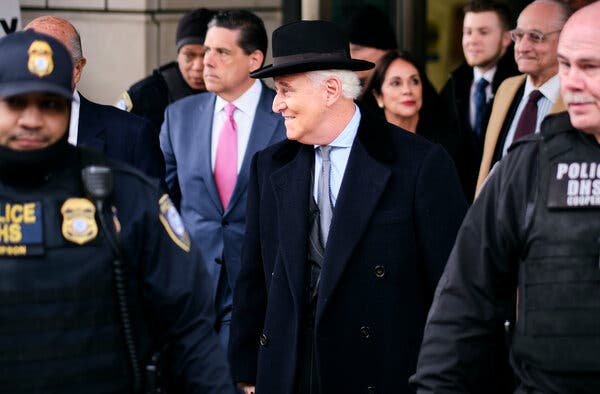
The Justice Department filed a civil suit on Friday against Roger J. Stone, one of former President Donald J. Trump’s most visible allies, for failure to pay nearly $2 million in federal income taxes.
The department said in its complaint, which also covered interest and other penalties, that the Treasury Department had notified Mr. Stone and his wife, Nydia Stone, that they had an unpaid tax liability, but that they had “failed and refused to pay.”
The chief counsel of the Internal Revenue Service authorized and requested the legal action, the complaint said.
Mr. Stone said in a statement on Friday evening that he and his wife worked to pay off their tax bill until the Russia investigation “financially destroyed” them, and that they are now “virtually bankrupt.”
He called the civil complaint “yet another example of the Democrats weaponizing the Justice Department.” He said he would fight the case, and he asked the public to support his legal defense fund.
Civil suits like the one filed against Mr. Stone are fairly routine, with the Justice Department filing a few hundred of them each year.
Mr. Stone is a longtime informal adviser and friend of Mr. Trump’s, a relationship that helped him avoid a 40-month prison term after he was found guilty of seven felony counts. The charges included lying to Congress, witness tampering, and obstructing a House inquiry into possible ties between the Trump campaign and Russia’s efforts to upend the 2016 election.
Mr. Trump commuted Mr. Stone’s sentence last summer and pardoned him in late December. But the pardon did not protect Mr. Stone from future legal troubles, and presidential pardons have generally not been used in the United States to erase a debt to the I.R.S.
The lawsuit alleges that from 2007 to 2011, and again in 2018, Mr. Stone, his wife and their investment entities failed to pay income tax on properties they held.
It also says that the Stones used Drake Ventures, an investment entity controlled by their family, to try to hide their wealth.
“Drake Ventures exists as a vehicle to receive income that belongs to the Stones and pay their personal expenses,” the complaint says. “Recognizing Drake Ventures as a separate entity despite these facts would sanction the Stones’ attempts to evade their tax obligations and conceal their assets from collection by creditors.”
In 2018 and 2019, Mr. Stone fraudulently transferred a total of $1 million in assets to accounts held by Drake Ventures, according to the complaint.
The Stones are also accused of using Drake Ventures to pay associates, relatives and others without providing required tax forms.
After Mr. Stone was indicted in 2019 in connection with the Justice Department’s investigation into Russian election interference, he and his wife created the Bertran Trust, the complaint said, and then used the trust to buy their house with their own assets in an attempt to hide it from the government.
The statute of limitations on tax crimes is generally 10 years from the date that a tax bill is assessed. But the lawsuit includes older tax infractions allegedly committed by the Stones because in May 2017, the couple began to negotiate a payment plan with the I.R.S., agreeing to pay $19,485 a month toward their unpaid taxes.
They made those payments from a Drake Ventures account, the government said.

The family of Tamir Rice, a 12-year-old boy who was shot and killed in 2014 by the Cleveland police, has asked Attorney General Merrick B. Garland to reopen the Justice Department’s investigation into the shooting, which was closed in December after the department said it could not charge the officers.
“The election of President Biden, your appointment, and your commitment to the rule of law, racial justice, and police reform give Tamir’s family hope that the chance for accountability is not lost forever,” lawyers representing Tamir’s mother, Samaria Rice, wrote in a letter to Mr. Garland on Friday. “We write on their behalf to request that you reopen this investigation and convene a grand jury to consider charges against the police officers who killed Tamir.”
Tamir Rice’s killing was one of several flash points in the long national debate over race and policing that reached a breaking point last summer, after video circulated of the Minneapolis police officer Derek Chauvin kneeling on the neck of George Floyd, a Black motorist, for more than nine minutes before Mr. Floyd died.
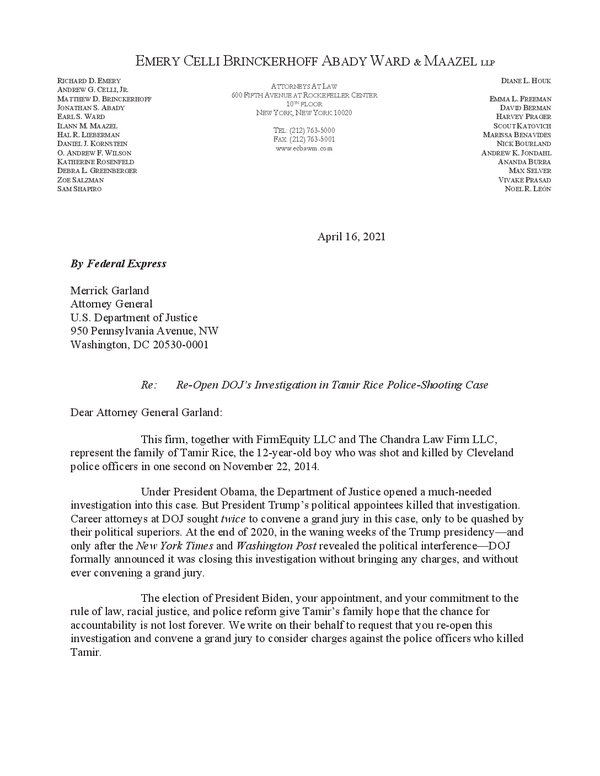
The request to reopen the inquiry into Tamir’s shooting comes against the backdrop of Officer Chauvin’s ongoing murder trial, the recent fatal police shooting of Daunte Wright in a Minneapolis suburb, and newly released police body camera footage of an officer in Chicago shooting a 13-year-old boy after he discarded a gun and seemed to be raising his hands.
The letter to Mr. Garland also comes after he and Mr. Biden have vowed to use the powers of the federal government to fight racial injustice, with a focus on discriminatory policing practices.
“We extend our deepest condolences to the Rice family,” a Justice Department spokesman, Anthony D. Coley, said on Friday. “The department has received their letter and will be reviewing it.”
The department has opened investigations into the police killings of Mr. Floyd and Breonna Taylor, a Louisville woman who was shot in her bed by the police. But it would be highly unusual for the department to reopen an investigation that it had already closed.
Immediately after Tamir’s shooting, the Justice Department opened a civil rights investigation into the shooter, Officer Timothy Loehmann. But some prosecutors felt it would be challenging to prove that the officer had intentionally violated the child’s civil rights. The pellet gun the boy had been playing with looked real and a 911 dispatcher had not relayed that Tamir was possibly a juvenile holding a toy. Officer Loehmann shot him immediately upon arriving.
But in 2017, career prosecutors had asked to convene a grand jury to gather evidence that Officer Loehmann and his partner had given false statements about whether the boy had been given warnings to put his hands up, possibly allowing prosecutors to bring an obstruction of justice case.
That request was denied by department officials in the Trump administration and all but closed, though Tamir’s family was never told. The issue was brought to light in October when The New York Times reported that a whistle-blower told the Justice Department’s inspector general that officials mishandled the case. Former Attorney General William P. Barr officially closed the case in December, after officials concluded that the video footage of the shooting was too grainy to be conclusive.
“I’m asking D.O.J. to reopen the investigation into my son’s case; we need an indictment and conviction for Tamir’s death,” Ms. Rice said in a statement on Friday.
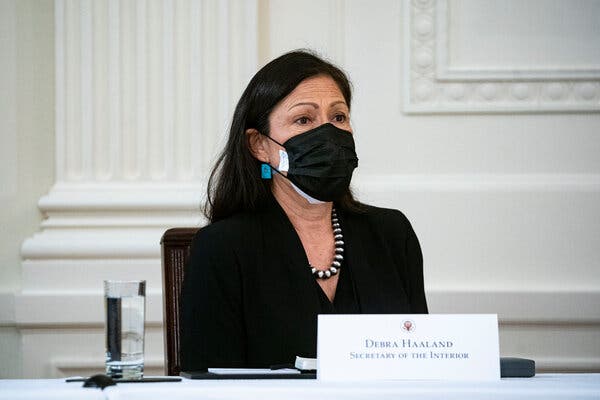
Interior Secretary Deb Haaland on Friday revoked a dozen Trump-era secretarial orders that promoted fossil fuel development on public lands and waters and imposed a new directive that prioritizes climate change in agency decisions.
The moves are the latest in a series of energy and environment policy changes at the Interior Department, which has become a partisan battlefield where much of President Biden’s climate agenda is being fought. Republicans have contested many of the agency’s moves, particularly pausing new oil and gas leases and a review of the federal leasing program.
The directives Ms. Haaland issued on Friday include revoking Trump-era orders that boosted coal leasing on federal lands; expedited permitting for coal, oil gas and nuclear energy projects; and suspended rules around fracking. She also rescinded an order designed to increase energy production in Alaska through new resource assessments of the National Petroleum Reserve there.
A separate secretarial order that was to be issued Friday would establish a climate task force to coordinate work to promote renewable energy across the agency. It also makes analyzing the impacts on climate change a central part of all of the agency’s decisions.
“At the Department of the Interior, I believe we have a unique opportunity to make our communities more resilient to climate change and to help lead the transition to a clean energy economy,” Ms. Haaland said in a statement.
She said the orders imposed under the Trump administration “unfairly tilted the balance of public land and ocean management toward extractive uses without regard for climate change, equity, or community engagement.”
Many of the Trump-era mandates were themselves a reaction to the emphasis on climate change in the Obama administration.
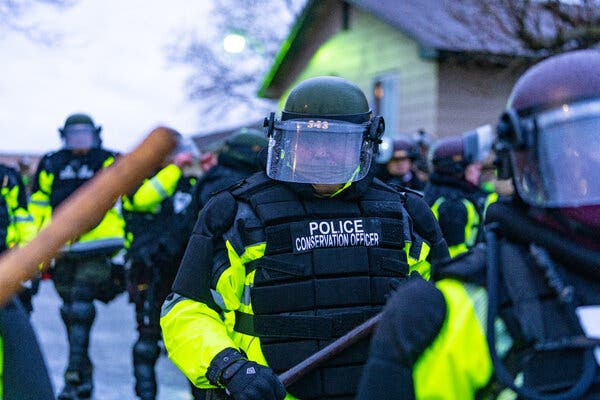
Attorney General Merrick B. Garland on Friday rescinded a Trump administration policy that curbed the use of consent decrees to address police misconduct, as the Justice Department prepares to step up its role in investigating allegations of racist and illegal behavior by police forces amid a nationwide outcry about the deaths of Black people at the hands of officers.
In a memo to U.S. attorney’s offices, Mr. Garland said that he was lifting restrictions on the use of consent decrees that had been imposed by Jeff Sessions when he was attorney general early in the Trump administration.
Consent decrees are court-approved deals between the Justice Department and local governmental agencies that create a road map for changes to the way they operate.
Under the Obama administration, the Justice Department aggressively used consent decrees and court monitors to push changes at police forces found to engage in a consistent pattern of abuse, as people nationwide decried the police killings of Black men in Baltimore, Chicago and Ferguson, Mo.
Mr. Garland’s memo was not unexpected, and it revives one of the department’s most effective tools in forcing law enforcement agencies to evaluate and change their practices.
His decision also comes against the backdrop of fresh unrest and protests sparked by the ongoing murder trial of Derek Chauvin, the former Minneapolis police officer who knelt on George Floyd’s neck for more than nine minutes before Mr. Floyd died, and the recent police killings of a motorist named Daunte Wright in the suburbs of Minneapolis and a 13-year-old boy named Adam Toledo in Chicago.
Mr. Garland said in his memo that consent decrees have historically been used in a wide array of contexts, including “to secure equal opportunity in education, protect the environment, ensure constitutional policing practices, defend the free exercise of religion” and more.
“A consent decree ensures independent judicial review and approval of the resolution” between the federal government and government entities found to have violated federal law, Mr. Garland said in his memo. They also allow for “prompt and effective enforcement” if those local government agencies do not comply with the terms of the agreement.
By the time a new wave of police killings sparked nationwide protests last summer, the Justice Department under the Trump administration had all but stopped using consent decrees to curb police abuses.
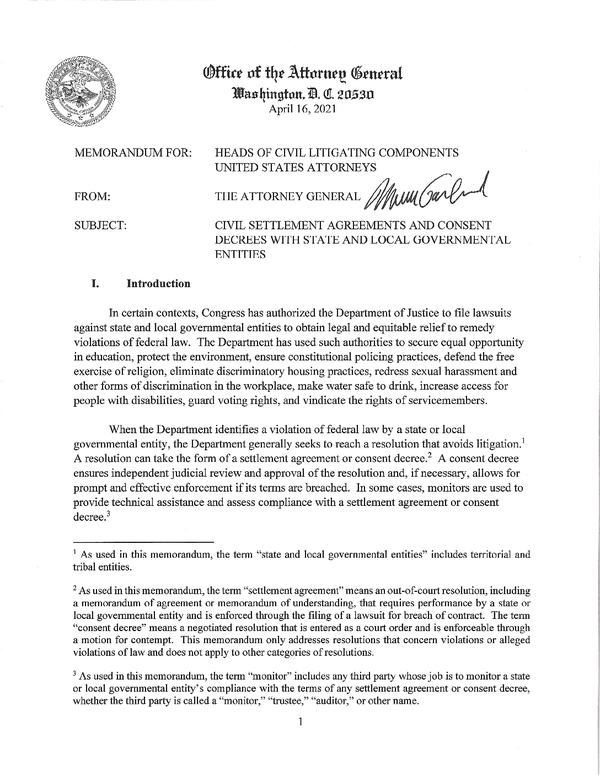
In a final act before stepping down in November 2018, Mr. Sessions drastically limited the department’s ability to overhaul police departments with a history of civil rights violations through the use of consent decrees and court monitors.
He imposed three new requirements on the use of such agreements, the most stringent of which forced career Justice Department lawyers to receive sign off on the agreements from politically appointed officials in the department.
Mr. Sessions also said that the department’s lawyers needed to lay out evidence of additional violations beyond unconstitutional behavior; and that consent decrees needed to have an end date, rather than end when the court was satisfied that improvements had been made.
Following Mr. Sessions’s memo, the department enacted virtually no new consent decrees with state or local law enforcement agencies.
Mr. Garland’s memo lifted those three restrictions.
transcript
transcript
White House Announces Nearly $2 Billion Plan to Track Variants
Andy Slavitt, a White House pandemic adviser, announced a $1.7 billion plan on Friday to bolster the nation’s ability to monitor coronavirus variants through genomic sequencing.
-
Even as we accelerate our efforts to get shots in arms, more dangerous variants are growing, causing increases in cases with people without immunity. This increases the urgency for you to get vaccinated, but it also requires us to intensify our efforts to quickly test for and find genetic sequence of the virus as it spreads. Today, we are announcing a $1.7 billion investment to bolster the ability of the C.D.C., and state and local public health departments to monitor, track and defeat emerging threats, whether it’s Covid-19 variants today or other viruses in the future, through a process known as genomic sequencing. This significant investment, which is made possible due to the American Rescue Plan President Biden signed into law last month, is critical in our fight against the new and potentially dangerous variants of Covid-19. Right now, these variants account for nearly half of all Covid-19 cases in the United States, and we need more capacity in our public health system to identify and track these mutations. State and local public health departments are on the front lines of beating back the pandemic, but they need more capacity to detect these variants early on before dangerous outbreaks. This funding will enable C.D.C. and states to do more genomic sequencing as we activate the nation’s great research capabilities to detect variants earlier and increase our visibility into emerging threats. This investment will give public health officials the chance to react more quickly to prevent and stop the spread.
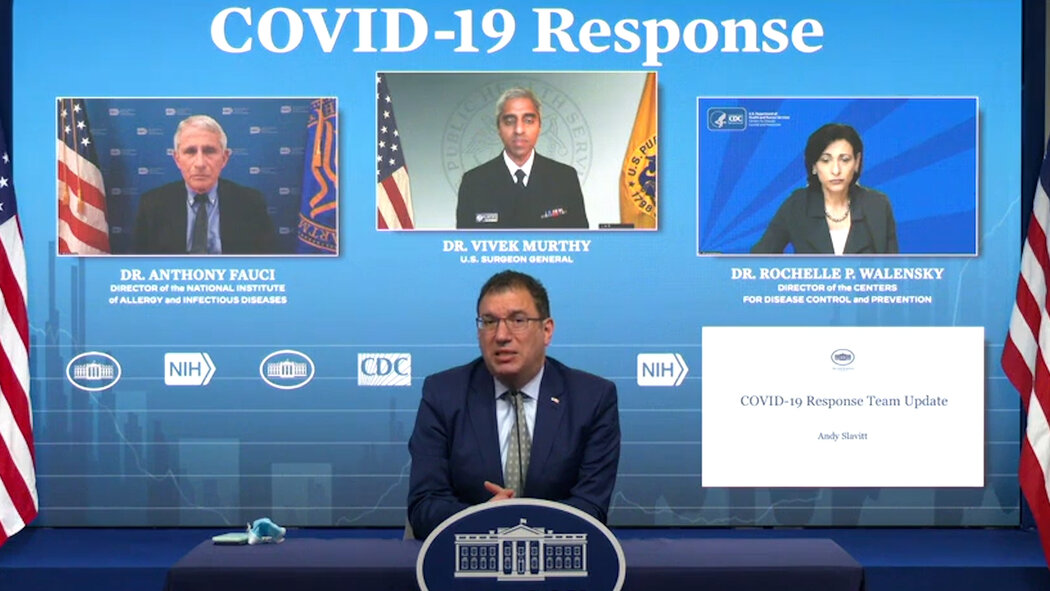
The White House on Friday announced an almost $2 billion plan for expanding and improving the nation’s ability to track coronavirus variants, an effort that public health experts have said is desperately needed to fight against variants that could drive another wave or potentially undermine the effectiveness of vaccines.
More than half of the funding, $1 billion, would go to the Centers for Disease Control and Prevention and states to monitor those variants by examining positive virus test samples. The tracking relies on genome sequencing, in which researchers read every genetic letter in a coronavirus’s genome to find out whether the virus belongs to a known lineage or is an entirely new variant with new mutations.
That money will be steered to the collection of samples and sequencing, then sharing the data with health officials and scientists, the White House said. The C.D.C. has so far leaned heavily on commercial laboratories to conduct that work.
The investment is the most significant effort by the federal government yet to speed up its ability to locate variants, which account for over half of the nation’s coronavirus infections and could, officials fear, prolong the pandemic in many parts of the country. One variant, a more contagious and more lethal variant known as B.1.1.7 and first identified in Britain, has become the dominant version in the United States, contributing to a surge in Michigan, the worst in the nation.
While new U.S. cases, hospitalizations and new deaths have declined from their peaks in January, new cases have begun increasing again after a weekslong plateau, reaching an average of more than 70,000 a day as of Thursday, according to a New York Times database.
“State and local public health departments are on the front lines of beating back the pandemic, but they need more capacity to detect these variants early on before dangerous outbreaks,” Andy Slavitt, a White House pandemic adviser, said at a news conference on Friday.
Carole Johnson, the Biden administration’s testing coordinator, said in an interview on Friday that the money, part of the recently passed American Rescue Plan, would arrive at the C.D.C. “quickly” and get to states by early May.
“We’re hoping that that gives a quick jolt to our response efforts,” she said.
The rest of the funding will go to two programs that appear to be aimed at organizing a more permanent architecture for sequencing samples. Four hundred million dollars will go to what the White House described as partnerships between state health departments and academic institutions. They could help develop new surveillance methods for tracking viruses.
And $300 million will go to creating a unified system that will allow scientists to store, share, and make sense of the vast amounts of new data. The goal is to quickly detect the spread of variants and enable prompt decisions about stopping them.
“This is about both doing the near term work of supporting sequencing but also really building out that infrastructure,” Ms. Johnson said.
In February, the Biden administration put forward $200 million as a “down payment” on a more robust surveillance program, with the goal of sequencing 29,000 samples weekly. Officials described it as an early step in building out the federal government’s capacity to sequence more samples.
Earlier this month, Dr. Rochelle Walensky, the C.D.C. director, said that the B.1.1.7 variant, which is currently estimated to be about 60 percent more contagious and 67 percent more deadly than the original version, had become the most common source of new infections in the United States. The C.D.C. has also been tracking the spread of other variants, such as B.1.351, first found in South Africa, and P.1, which was first identified in Brazil.
Ms. Johnson said that the funding would help health officials across the country respond to outbreaks in a more sophisticated way, including by surging testing in certain areas or considering new mitigation strategies.
When B.1.1.7 was first detected in the United States at the end of December, experts warned that the country was poorly prepared to track coronavirus variants, lacking a national plan for collecting samples and analyzing their mutations to determine the variants’ spread.
In January, the United States was sequencing samples from less than 1 percent of positive coronavirus tests. Researchers said that simply wasn’t enough information to know how common variants really were and how quickly they were spreading. By contrast, Britain, the world’s leader in genomic surveillance, was sequencing up to 10 percent of new positive tests.
Over the past three months, the C.D.C. has charted a steady rise in the number of coronavirus genomes sequenced weekly in the United States, recording a new high of 14,837 for the week ending April 10. The number represented about 3 percent of the country’s positive tests that week.

The Russian government plans to expel 10 American diplomats and ban other American officials from traveling to Russia in retaliation for sanctions announced this week by the Biden administration, Russia’s foreign minister said Friday.
Though Sergei Lavrov, the foreign minister, said other measures would be announced later, limiting the initial response to diplomatic expulsions suggested the Russian government did not intend an escalation that could worsen already dismal relations between the countries.
Ten American diplomats stationed in Russia will be asked to leave the country and eight so far unnamed officials in the Biden administration will be banned from entering Russia, Mr. Lavrov said.
President Biden suggested the sanctions would signal a harder line toward Moscow, though he left a door open for dialogue, after years of deferential treatment under the Trump administration. Mr. Lavrov called the sanctions an “absolutely unfriendly and unprovoked action.”
But if the Russian response is largely limited to the expulsions and travel bans, it would be seen as a positive sign that the Kremlin does not intend to raise the diplomatic stakes and may remain open to the invitation to a summit meeting, possibly in a European country sometime over the summer, that Mr. Biden extended to President Vladimir V. Putin this week.